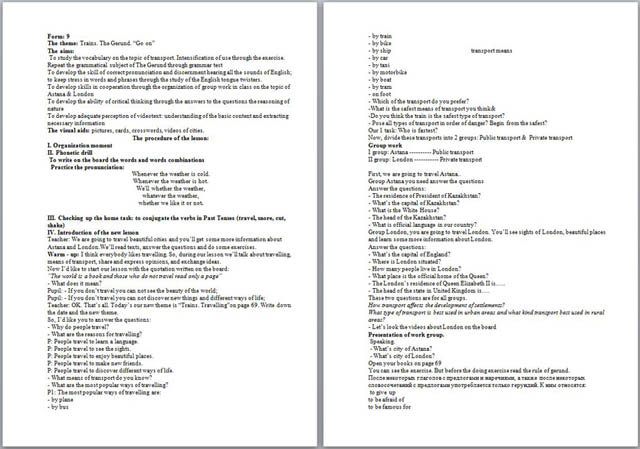The aims:
To study the vocabulary on the topic of transport. Intensification of use through the exercise.
Repeat the grammatical subject of The Gerund through grammar test
To develop the skill of correct pronunciation and discernment hearing all the sounds of English; to keep stress in words and phrases through the study of the English tongue twisters.
To develop skills in cooperation through the organization of group work in class on the topic of Astana & London
To develop the ability of critical thinking through the answers to the questions the reasoning of nature
To develop adequate perception of videotext: understanding of the basic content and extracting necessary information
The visual aids: pictures, cards, crosswords, videos of cities.
The procedure of the lesson:
I. Organization moment
II. Phonetic drill
To write on the board the words and words combinations
Practice the pronunciation:
Whenever the weather is cold.
Whenever the weather is hot.
We'll whether the weather,
whatever the weather,
whether we like it or not.
III. Checking up the home task: to conjugate the verbs in Past Tenses (travel, snore, cut, shake)
IV. Introduction of the new lesson
Teacher: We are going to travel beautiful cities and you’ll get some more information about Astana and London. We’ll read texts, answer the questions and do some exercises.
Warm - up: I think everybody likes travelling. So, during our lesson we’ll talk about travelling, means of transport, share and express opinions, and exchange ideas.
Now I’d like to start our lesson with the quotation written on the board:
“The world is a book and those who do not travel read only a page”
- What does it mean?
Pupil: - If you don’t travel you can not see the beauty of the world;
Pupil: - If you don’t travel you can not discover new things and different ways of life;
Teacher: OK. That’s all. Today’s our new theme is “Trains. Travelling”on page 69. Write down the date and the new theme.
So, I’d like you to answer the questions:
- Why do people travel?
- What are the reasons for travelling?
P: People travel to learn a language.
P: People travel to see the sights.
P: People travel to enjoy beautiful places.
P: People travel to make new friends.
P: People travel to discover different ways of life.
- What means of transport do you know?
- What are the most popular ways of travelling?
P1: The most popular ways of travelling are:
- by plane
- by bus
- by train
- by bike
- by ship transport means
- by car
- by taxi
- by motorbike
- by boat
- by tram
- on foot
- Which of the transport do you prefer?
- What is the safest means of transport you think&
- Do you think the train is the safest type of transport?
- Pose all types of transport in order of danger? Begin from the safest?
Our 1 task: Who is fastest?
Now, divide these transports into 2 groups: Public transport & Private transport
Group work
I group: Astana - - - - - - - - - - Public transport
II group: London - - - - - - - - - - - Private transport
First, we are going to travel Astana. .
Group Astana you need answer the questions
Answer the questions:
- The residence of President of Kazakhstan?
- What’s the capital of Kazakhstan?
- What is the White House?
- The head of the Kazakhstan?
- What is official language in our country?
Group London, you are going to travel London. You’ll see sights of London, beautiful places and learn some more information about London.

Answer the questions:
- What’s the capital of England?
- Where is London situated?
- How many people live in London?
- What place is the official home of the Queen?
- The London’s residence of Queen Elizabeth II is…. .
- The head of the state in United Kingdom is….
These two questions are for all groups.
How transport affects the development of settlements?
What type of transport is best used in urban areas and what kind transport best used in rural areas?
- Let’s look the videos about London on the board
Presentation of work group.
Speaking.
- What’s city of Astana?
- What’s city of London?
Open your books on page 69
You can see the exercise. But before the doing exercise read the rule of gerund.
После некоторых глаголов с предлогами и наречиями, а также после некоторых словосочетаний с предлогами употребляется только герундий. К ним относятся:
to give up to be afraid of to be famous for to be fond of to be interested in to be worth of to be proud of to depend on to insist on (upon) to know of to object to to prevent from to think of to go on
You are proud of being a docker, aren't you? (Вы гордитесь тем, что вы - докер, не правда ли?)
Весь материал – смотрите документ.

 Получите свидетельство
Получите свидетельство Вход
Вход












 Конспект занятия по английскому языку "Trains. The Gerund. “Go on”" (40.5 КB)
Конспект занятия по английскому языку "Trains. The Gerund. “Go on”" (40.5 КB)
 0
0 883
883 108
108 Нравится
0
Нравится
0


